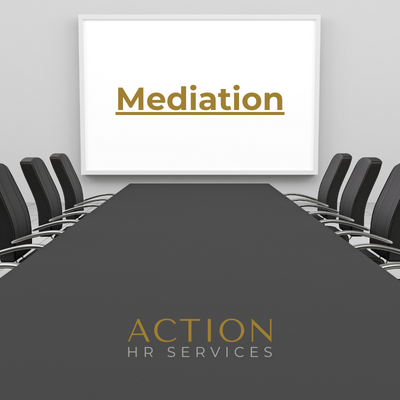Mediation in Ireland
Whilst conflicts have long been a part of the working world, in today’s society, we have abundant guidance and resources available to effectively address such issues before they reach boiling point. Differences in perspectives, interests and personalities can lead to disagreements, which left unresolved can disrupt the harmony of the workplace. This is where workplace mediation comes into play.
.

What is Mediation
Mediation is an informal voluntary process where an accredited, impartial, independent, qualified and competent third party assists individuals in conflict, to work through their disagreement and reach their own outcome for resolving differences. The process is about reflecting, exchanging viewpoints and then moving on.
Mediation has evolved into an essential tool in the workplace. In the absence of conciliatory intervention, workplace conflicts can lead to work disruptions, decreased productivity, project failure, absenteeism, turnover and termination. If left unchecked, disputes can fester and escalate, potentially leading to grievance and disciplinary procedures.
Mediation helps to avoid these more formal routes by guiding participants towards reaching mutually acceptable solutions. The longer a dispute goes on, the greater the chances that people’s relationships will break down.
The Code of Practice in Ireland for Employers and Employees on the Prevention and Resolution of Bullying at Work and The Code of Practice on Sexual Harassment and Harassment at Work outline the value of mediation and the importance of early intervention to restore workplace relationships.
The Value of Mediation
Mediation is a valuable tool at any stage in a procedure, but particularly beneficial at the earliest possible stage. It is established that the earlier a mediation process is used, the greater the potential for resolving the matter satisfactorily. It is important that suitably qualified mediators, whether internal or external, are used.
What is discussed in mediation is confidential in that if an agreement is not reached and the matter proceeds to other resolution stages or the WRC, the parties can make no reference to anything that was said in mediation.
The Role of the Mediator
The Mediator assists conflicted parties to understand their issues and help them to reach an agreement.
- The Mediator will begin mediation by listening to each individual story separately.
- Next, the Mediator will bring the individuals together to meet face-to-face. They will be afforded an equal chance to speak and explain their perspective.
- Following this, they will brainstorm mutually beneficial solutions.
- Once both parties settle on a solution, the agreement will be summarised.
- Finally, the Mediator will clarify the steps that each participant will need to take and what the expectations are for the future.
Why should we use Mediation?
- Mediation is confidential – disputants can air and resolve their differences without ‘everyone knowing’.
- An external Mediator has no prior connection to the employee or the organisation and is involved in the situation at hand therefore their impartiality is guaranteed.
- Mediation provides individuals with a secure and neutral environment to express their grievances.
- Mediation can address workplace disputes discreetly, without the need to involve other employees or management.
- Mediation can intervene before disputes escalate to involve formal procedures.
- Mediation helps with a more effective communication and sets the standard for future conduct.
Advantages of Workplace Mediation
In essence, workplace mediation empowers employees to take control of the outcome, navigate through their differences, prevent the escalation of conflicts into more serious issues, and ultimately facilitate the participants to reach an agreement together resulting in the restoration of harmony within the workplace environment.
This article was written by Sharon Sweeney, HR Consultant at Action HR Services
Contact any of our consultants if you are in need of expert HR Advice.
DISCLAIMER:
The information in this article is provided as part of the Action HR Services Blog. Specific queries should be directed to a member of the Action HR Services Team and it is recommended that professional advice is obtained before relying on information supplied anywhere within this article. This article is correct on 26th January 2024.
